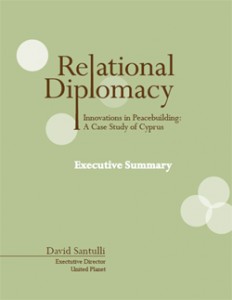What is Relational Diplomacy?
Relational Diplomacy is an approach to sustainable peacebuilding which recognizes that individual interpersonal relationships are the most essential and basic element—the building blocks for peace.
Traditional conflict-centered approaches focus on the issues and memory of the conflict. In contrast, relational diplomacy deals with fostering interpersonal relationships, in the form of friendships, between people on all levels. Conflict is set aside in favor of focusing on the commonalities of people.
The premise is that friendship, with associated understanding and appreciation of the humanity in each other, is the first step to peace.
Relational Diplomacy and New Communications Technology
- Download the Executive Summary of the book.
- Purchase a copy of the full book on Amazon.com.

How Technological Innovations Can Build Relationships Without Borders and Contribute to a More United Planet; Case Study on Peacebuilding in Cyprus
David Santulli has written an incisive and prescient portrait of a peace movement in Cyprus that was built on a foundation of technological exchanges and understandings.
Recent developments in Egypt and Tunisia have proved how citizens can exploit these technology tools to spread the word about democracy, and to foster positive relationships between individuals and groups of people.
“We can easily agree that the Internet has changed our world. But we have yet to see just how well humans can learn to use this new technology, and how well we can exploit its potential to build positive change. As the early years tick on, we are witnessing some shining examples of people who are using the tool to craft a new way of relating. The citizens’ movement for peace in Cyprus, which ended with the opening of the border in 2003, was one of the first to tap into its power.
By its very nature, the Internet reaches beyond borders and boundaries – physical, cultural, religious, ethnic. It is a technology with unprecedented powers to bridge divides, enhance communication, and build communities. It empowers citizens as individuals, and as a movement. This is just the beginning, as we move through and beyond “Web 2.0” into an age where generations are born into instant and constant cross-communication. We have yet to see how the evolution of the technology will unite us – as citizens, as humans.
In Cyprus, it was relational diplomats, from both sides of the infamous green line, who created a citizens movement that eventually led to the opening of the borders. By employing innovative peacebuilding techniques and utilizing technology, these peacebuilders reframed the conflict and planted seeds of peace among the citizens of Cyprus. In a world grown weary of conflict, the lessons and innovations gleaned from the peacebuilders of this small island state provide valuable clues for other parts of the world.